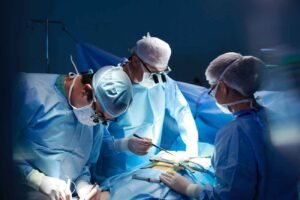Overview of Laparoscopic Surgery
Laparoscopic surgery is a minimally invasive surgical procedure that uses small incisions and specialized tools to perform various surgical interventions. This technique has gained popularity due to its numerous advantages and considerations.
Advantages and Considerations
Laparoscopic surgery offers several advantages compared to traditional open surgery. First and foremost, it involves smaller incisions, resulting in less scarring and reduced postoperative pain. Additionally, the recovery time is generally shorter, allowing patients to return to their normal activities more quickly.

It is important to note that not all surgical procedures can be performed using the laparoscopic approach. The feasibility of laparoscopic surgery depends on various factors, such as the patient’s overall health, the complexity of the procedure, and the surgeon’s expertise. Therefore, it is essential to consult with a qualified surgeon to determine if laparoscopic surgery is a suitable option for your specific case.
Common Procedures
Several common procedures can be performed using laparoscopic techniques. These include gallbladder removal, appendectomy, hernia repair, and ovarian cyst removal. These procedures are typically less invasive and have a lower risk of complications than their open-surgery counterparts.
Preoperative Preparation
Before undergoing laparoscopic surgery, certain preoperative preparations need to be taken into account.
Lifestyle Changes Before Surgery
Preparing for laparoscopic surgery involves making certain lifestyle changes to optimize your overall health. This may include maintaining a balanced diet, engaging in regular exercise, and avoiding habits such as smoking and excessive alcohol consumption. These lifestyle modifications can contribute to a smoother surgical experience and enhance the recovery process.
Mental and Emotional Readiness
In addition to physical preparation, it is crucial to address your mental and emotional well-being before undergoing laparoscopic surgery. Managing stress, seeking support from loved ones, and discussing any concerns or fears with your healthcare provider can help alleviate anxiety and promote a positive mindset.
Postoperative Care at Home
After laparoscopic surgery, proper postoperative care is essential for a smooth recovery. This includes managing incisions and wound care, as well as gradually resuming daily activities.
Managing Incisions and Wound Care
Proper wound care is crucial to prevent infection and facilitate healing. It is important to keep the incisions clean and dry, as instructed by your surgeon. Additionally, following any dressing changes or medication schedules is vital for optimal recovery.
Resuming Daily Activities Gradually
While it is important to rest and allow your body to heal after laparoscopic surgery, gradually resuming daily activities is equally important. Your surgeon will provide specific instructions regarding physical activity restrictions and guidelines for a safe and gradual return to normal routine.
Potential Complications
As with any surgical procedure, laparoscopic surgery carries potential risks and complications. It is essential to be aware of these and recognize warning signs that may require immediate medical attention.
Recognizing Warning Signs
It is important to monitor your body closely after laparoscopic surgery and be aware of any signs of complications. These may include excessive bleeding, persistent pain, fever, or signs of infection. If you experience any of these symptoms, it is crucial to seek immediate medical attention.
Immediate Actions to Take
In case of any potential complications, it is important to take immediate action to ensure your well-being. This may involve contacting your surgeon or seeking emergency medical care, depending on the severity of the situation. Prompt action can significantly contribute to a positive outcome.
Follow-Up Care and Monitoring
After laparoscopic surgery, follow-up care and monitoring play a vital role in the overall recovery process.
Importance of Post-Surgery Check-ups
Attending post-surgery check-ups is crucial to monitor your progress and address any concerns or complications that may arise. Your surgeon will evaluate your healing process, remove sutures or staples if necessary, and provide further guidance on your recovery journey.
Long-Term Recovery Strategies
Long-term recovery strategies may involve making lifestyle adjustments, engaging in physical therapy if required, and adopting a healthy diet to support your body’s healing process. It is important to follow your healthcare provider’s recommendations and stay proactive in maintaining your overall well-being.
In conclusion, understanding laparoscopic surgery and recovery is essential for patients considering or undergoing this minimally invasive surgical technique. By familiarizing yourself with the overview of laparoscopic surgery, preoperative preparation, postoperative care, potential complications, and follow-up care, you can approach the surgical process with confidence and optimize your chances for a successful recovery.
